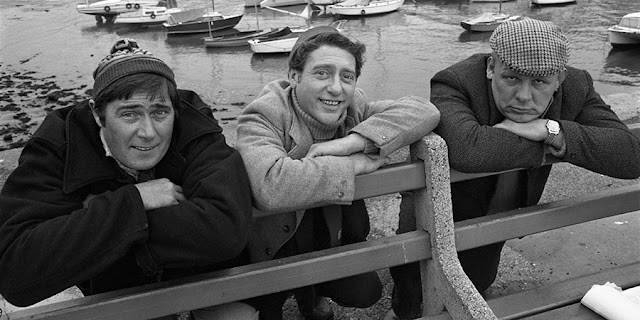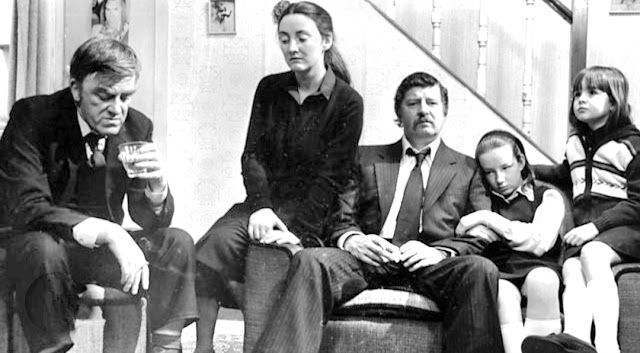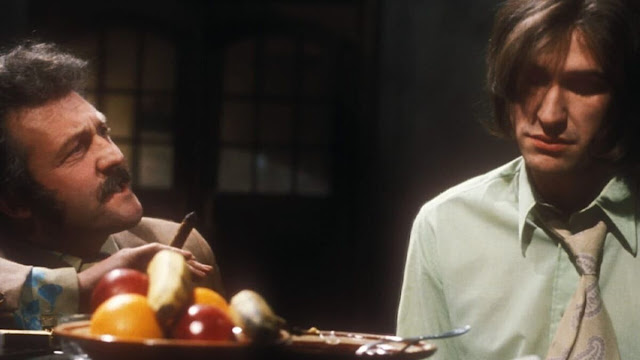The Fishing Party, by Peter Terson, broadcast June 1st 1970
"You 'aven't got any mates? I couldn't live without mates!"
Phil - Shot entirely on film, The Fishing Party is a gentle comedy about a trio of middle-aged Yorkshire miners going on a fishing trip to Whitby, where they have to contend with seasickness and the appalling snobbery of a guesthouse landlady, reluctantly aided by her henpecked husband. It begins with a cheerful brass band theme written by composer Sidney Sager (fondly remembered for his excellent score for Children of the Stones), just to confirm that the viewer knows that we are in the North.
The three miners, Art (Brian Glover), Abe (Douglas Livingstone) and Ern (Ray Mort) begin their visit with a mug of tea at a seafront stall, where the stallholder warns them that the holiday season is over. The miners seem offended that he has taken them for "trippers" rather than serious fishermen and there is an exchange where the dialogue felt a little too contrived. Fortunately, the play soon finds its feet with the introduction of the splendidly awful Audrey, played by Jane Freeman.
If Patricia Routledge hadn't been available to play Hyacinth Bucket in Keeping Up Appearances, Jane Freeman would have made the role her own. She is brilliant as the appalling Audrey, who runs a guesthouse with her husband Brian (Frank Moorey).
When Art, Abe and Ern turn up, looking for a room for the night, she instantly has the measure of them and knows that she can both overcharge them and get away with treating them like dirt. Brian is her unwilling accomplice, occasionally trying to prick Audrey's conscience, but she is not prepared to give any ground. The miners are pathetically grateful for what little they receive and it is this aspect of the play that I felt saved it from being little more than a vaguely patronising comedy, populated by caricatures.
I was particularly touched by Brian Glover's character, Art, who sees himself as a little more worldly than his friends and takes great pleasure in explaining what an entrée is, anticipating that it will be a part of their dinner.
Needless to say, Audrey has no plans to furnish them with an evening meal and they end up in a fish and chip shop, where they flirt with the mini-skirted waitress, giggling like teenage boys when she delivers one of several put-downs.
I don't think it will count as a spoiler to add that after eating a double cod and chips, followed by copious amounts of brown ale, their fishing expedition is not an unqualified success. But it is not the plot that makes this Play for Today enjoyable, but the social observations about class. It is poignant that these miners, who have spent a large part of their lives working underground, have such a meager sense of entitlement that they can't see when they're being treated like dirt.
Art's determination that they will behave like proper gentlemen gives them a dignity that contrasts with the ghastly Audrey, who affects a posh accent to assert her questionable social superiority, using absurd phrases like "There is contact with the lavatory on each floor."
When The Fishing Party begins, it looks as if the miners are going to be little more than figures of fun, but by the end it is hard not to feel touched by their friendship, generosity of spirit and their quest to seek a small, brief amount of pleasure in a life that offers precious little of it.
I really enjoyed this episode. It evoked childhood memories of holidays in windswept resorts, where grim, unwelcoming guesthouses served a watery brown soup of indeterminate origin. I don't remember anyone as awful as Audrey, but I recall spending afternoons sitting under seafront shelters in the rain, as it was made clear that "guests" were required to vacate the premises between breakfast and teatime.
I suppose some might complain that The Fishing Party presents a stereotypical view of Yorkshire, populated by cosy, "Ee bah gum" stereotypes that seem as if they've escaped from an episode of Last of the Summer Wine, but that would be churlish. This is a comedy that manages to both amuse and provide social comment without sermonising.
A tolerably clear print of The Fishing Party can be seen on YouTube, but the BBC have also released it on DVD - a rare honour for this series.
Z:
The Fishing Party is a gentle comedy, at times bordering on farce, telling the age-old story of innocents abroad. It starts with a shot of a bus stopping by a harbour somewhere in the British Isles, late on a rainy afternoon. Against a cheerful brass band soundtrack, we watch as the bus pulls away, revealing a party of three, carrying what you later realise are fishing rods.
These are the main characters of the play, miners having a weekend away to go fishing – something they have never done before but which somehow represents an idea of what a good time is for them. Even in this first scene, although we are viewing them from a distance, they convey through the way they move their excitement and intention to enjoy themselves. As the play continues, they remain steadfastly cheerful, refusing to be disappointed, delighting in the very small pleasures on offer.
After buying pints of tea from a bloke with a stall on the beach, the miners set off to find somewhere to stay. One of them has aspirations and insists they stay in a private hotel, not down on the quay where most fishermen go. He dreams of three-course meals and style. He lands up in the sort of place Bill Bryson describes in Notes from a Small Island, a place with candlewick counterpanes and a landlady who does not consider making her guests feel at home to be any part of her role – she even ponders not giving them clean sheets.
Almost everyone in the play is a kind of stereotype - the battleaxe landlady, her henpecked husband, the good-natured miners who over-indulge in brown ale, value being mates over almost anything and are actually rather pleased to end up eating fish and chips on the pier rather than entrees and dainty tableware. The gnarled old fisherman who takes the trio of miners out to catch cod at first seems to be shaping up as some kind of totemic emblem or symbol who may lead the play into magical realist territory, but in the end he turns out to be simply a very experienced fisherman who, thanks to hard times, now takes day trippers out instead of plying his trade himself.
If anyone were to want to be offended, it might be possible to think the play is patronising, but for me it seemed too affectionate for that. Interestingly, although broadcast in 1972, the lives of the characters are still framed within the memory of the war – in the fishing scene the fisherman and the miners admit to each other that they were all in reserved occupations and so didn’t actually take part in combat. But the most striking element of the play for me was the creeping realisation as I watched it that, although I recognised everything about the Britain that was being portrayed, almost every detail of it has vanished since.
PS Like Phil, I loved Art and his dreams.





Comments
Post a Comment